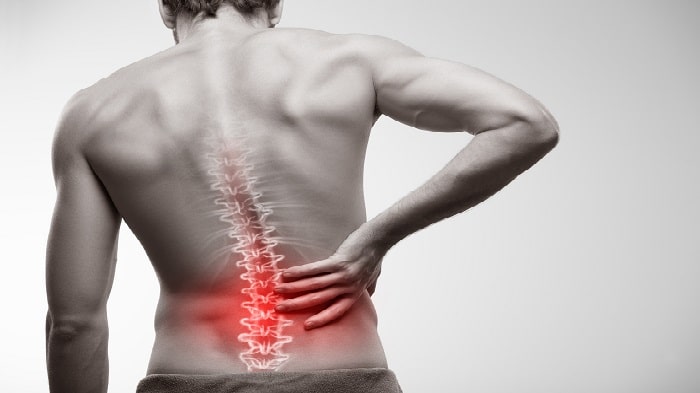Back pain can be manifested as chronic pain as it can disappear and re-appear after treatment. However, back pain doesn’t just end with aching muscles or a burning sensation on your spine. Studies have found that back pain, specifically lower back pain, can limit your ability to move. This can also cause disability or other health problems.
This article will look into the details of how back pain affects your overall health. Read on.
-
Back Pain Affects Your Mobility
The back consists of the spine, the spinal nerves, spinal cord, muscles, and ligaments. All these structures come together to support the weight of the body and allow movement and flexibility.
One of the major functions of the back is to allow movement, when any part of the back is injured, it can cause back pain which could hinder your ability to move. Therefore, you should seek treatment as early as possible before the back pain can advance. Look here to know more about back and neck pain and how to treat them.
The back pain that mostly affects your mobility and sometimes leads to disability is mostly experienced in the lower back and the base of the neck. Unfortunately, these two body parts support the most weight, making them integral to your mobility. Back pain may not entirely cause disability, but you may be unable to maintain an upright posture. This is because the spine helps you stay upright.
-
Back Pain Affects Your Mental Health
Chronic pain is pain that lasts more than three months. Back pain can be chronic when it lasts for more than three months or disappear in less than six months. When back pain is chronic, it affects your mental health. Here’s how:
-
Chronic Back Pain Causes Anxiety and Depression
When you’re suffering from pain for a prolonged period, it can be hard to stay in a good mood. If anything, you’re more likely to be sad and worried about when the pain will be over or when it’ll get better. This constant state of worry causes anxiety which is one of the major mental health issues. Also, when pain affects your mood, you’re in a prolonged period of sadness and extreme lows which make you more prone to depression.
-
Chronic Back Pain Affects Your Sleep Patterns
You may have noticed that pain becomes worse at night. This is because the metabolism rate and hormonal levels change as your body prepares to rest. These biochemical changes sometimes cause pain to be more severe.
When you’re in pain, it can be hard to fall asleep. You may also experience sleep disturbance which compromises your sleep quality. That’s why insomnia is common among people suffering from chronic pain like back pain. The problem with insomnia is that it intensifies conditions like anxiety and depression.
Your overall performance at work during the day may also be affected. When you can’t work or do the things you love, you’re more likely to become depressed. In this case, back pain affects your sleeping patterns, causing new mental health conditions or worsening the existing ones.
-
Chronic Back Pain Causes Stress
Although stress isn’t a mental health illness, it can worsen existing conditions. For example, stress can heighten anxiety. Also, when you’re stressed, your muscles tend to tighten up which can worsen the back pain that you’re already experiencing.
The biggest danger with mental health and chronic back pain is that it can cause new mental health conditions or worsen existing ones. At the same time, mental health conditions like anxiety and depression have been found to worsen chronic back pain. This, therefore, becomes a vicious cycle that drains your health and quality of life.
-
Other Effects Of Back Pain On Your Health
When the spine is injured, or one of the stacks of bones is misaligned, it causes excessive pressure on the exposed nerves, which manifests as back pain. This nerve interference, however, has far-reaching consequences since it can cause a reduction in nerve energy. When there isn’t enough nerve energy, the body system begins to be dysfunctional, putting it at greater risk of being attacked by disease.
Another consequence of nerve interference is a compromised digestive system. Usually, the digestive system and nervous systems work together for proper digestion. This is because the nervous system facilitates communication between major digestive organs. When this communication is compromised, digestion may not occur properly, and you may begin to experience gut problems like constipation and bloating.
Additionally, the back pain may be transmitted to the stomach by the nerve system. When this happens, you may begin to experience stomach aches when in a real sense, it’s your back that is in pain. Therefore, you end up having discomfort in your stomach and back.

Causes Of Back Pain
Now that you know how back pain affects your overall health, it’s important to know what causes your back pain in the first place. This will help you take all precautions necessary to help avoid developing back pain.
Below are the causes of back pain:
-
Spinal Misalignment
Spinal misalignment can happen due to several things. They include:
- Poor sitting posture. This mainly affects people who spend most of the day sitting in the office or behind the driving wheel.
- Injuries from sports, accidents, or congenital disabilities can also cause misalignment of the spine bones.
-
Muscle or Ligament Strain
A sudden awkward body movement can strain your muscles or ligaments especially when you were when lifting, pushing, or pulling heavy objects.
Sometimes you may experience muscle spasms when your muscles are strained and don’t relax. This can often manifest as low back pain.
-
Osteoporosis
This health condition weakens your bones, making them more likely to break. The condition develops over time and is often detected when you fall or experience a sudden impact that causes your bones to break. The major bones affected are the hip bone, wrist, and spine.
-
Osteoarthritis
It’s a type of arthritis that develops when the cartilage tissue at the end of the bones wears out. This cartilage tissue usually acts as a cushion that protects the bones from grinding at each other. This condition mainly develops on the hips, knees, hands, and spine joints.
When the protective cartilage in the spine wears off, the herniated disks and the bone spurs which pushes the nerves causing nerve interruption. This pressure on the nerve, therefore, manifests as back pain.
-
Pregnancy
Sometimes the weight gain from being pregnant may cause muscle and ligament strain, leading to back pain. Hormonal changes during pregnancy can also cause back pain. Pregnancy is, in fact, one of the major causes of back pain among women.
Other conditions that may increase your chances of getting back pain include:
- Living a sedentary life. Doctors recommend that you have at least 30 minutes of movement or everyday
- Occupational activities like heavy lifting
- Health conditions like cancer
- Obesity
- Straining during physical fitness
- Old age
- Genetic disorders
- Smoking
Symptoms Of Back Pain
In most cases, back pain isn’t a one-time condition as it develops over time unless it develops through an injury. Therefore, it can be pretty challenging to nail down specific symptoms of back pain. However, if you experience the following symptoms while registering back pain, it may be time to see a doctor:
- A sharp or dull persistent pain in your back
- Radiating pain, tingling, weakness, or numbness in your legs and arms
- Swelling of your back
- Pain down the legs
- Back pain that doesn’t ease when you lie down or rest
- Numbness around your anus, buttocks, and genitals
- Loss of control over your bowel movements
- Muscle weakness and inability to pee or uncontrolled peeing maybe a sign of a serious problem with your spine
- Spinal misalignment often manifests as high blood pressure, depression, anxiety, acid reflux disease, fibromyalgia, fatigue, and a weak immune system. Therefore, if you experience these symptoms and the doctors can’t conclude your diagnosis, it would be best if you had your spine checked.
Summary
Back pain has adverse effects on your overall health. For starters, back pain may lead to disability where your ability to move is compromised. Second, when the pain is chronic, it affects your mental health. Chronic back pain may cause you to develop mental health conditions like depression and anxiety. It may also worsen already existing conditions.
Research has shown that mental health conditions worsen chronic back pain. This is arguably one of the most adverse effects of back pain on your health. The article details the effects and causes of back pain that can affect your overall health.


















